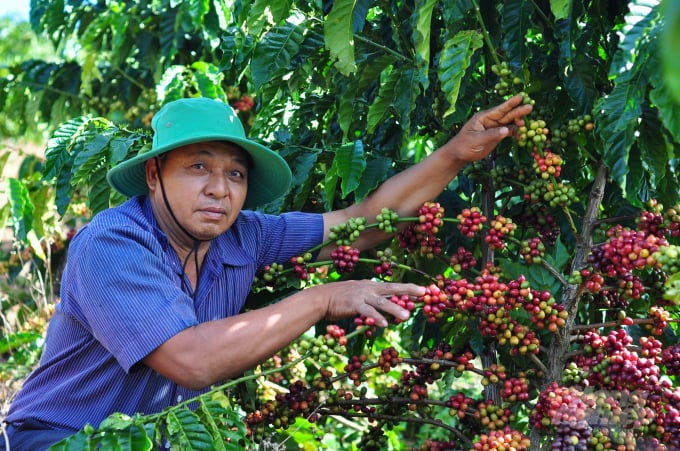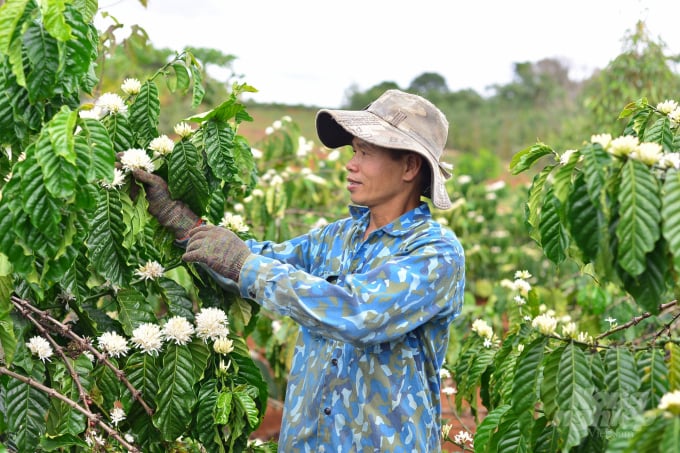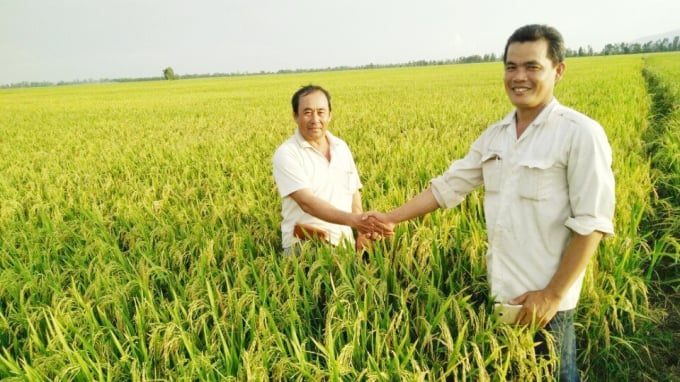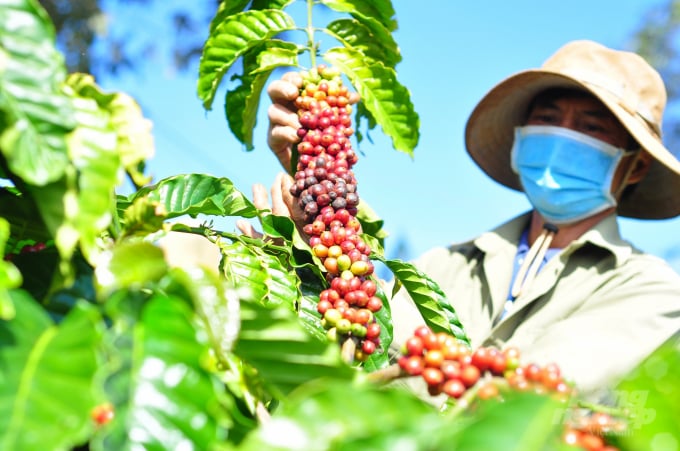May 29, 2025 | 12:40 GMT +7
May 29, 2025 | 12:40 GMT +7
Hotline: 0913.378.918
May 29, 2025 | 12:40 GMT +7
Hotline: 0913.378.918
“After more than 6 years of implementation with funds from the World Bank (WB) and support of local authorities as well as the Ministry of Agriculture and Rural Development (MARD), the project's targets have been completed and even exceeded the scheduled plan,” said Mr. Le Van Hien, VnSAT Project Director.
According to Hien, up to now, the VnSAT project has completed 11 supporting plans on agricultural restructuring for the rice and coffee industries. Through these 11 plans, local agricultural restructure has been accelerated.

The coffee productivity, quality, and profit of growers in the Central Highlands have greatly improved thanks to the VnSAT project's comprehensive effec.ts. Photo: TD.
In addition, the project has also coordinated with MARD agencies such as the Department of Crop Production, Department of Economic Cooperation and Rural Development (DECRD) as well as many related units to carry out 21 technical support activities, helping localities to train farmers, especially those in agricultural extension, seed management, big project construction and monitoring of greenhouse gas emissions in rice production. Local authorities have also closely and effectively cooperated with the project to organize training courses for farmer organizations and cooperatives.
With the above results, the WB and relevant localities and agencies under MARD have appreciated VnSAT as one of the projects with the most effective and successful use of funding from the WB. The VnSAT project has had a great impact on neighboring areas, attracting many farmers to learn and approach new methods in rice and coffee farming.

Local authorities, MARD as well as the World Bank highly appreciate the VnSAT project's effective use of capital, bringing about a comprehensive success. Photo: PH.
Mr. Le Duc Thinh, DECRD Director affirmed: “The VnSAT is one of the projects using loans effectively and successfully in all fields". According to Thinh, Vietnam is an agricultural country and the two industries of rice and coffee are not only a story about food security but also promise a great export profit.
“The VnSAT project has a total investment capital of more than USD300 million implemented in 5 years. It sounds like a big deal, but compared to the export value of the two industries of rice and coffee in the years so far, it is not too big. After the VnSAT project ended, we have completely changed the face of Vietnam's two strategic sectors. Thereby, not only does it support how many farmers, and how many cultivated areas, but also creates a different image of Vietnam's agricultural products. On that basis, large enterprises have joined the chain of links," said Mr. Thinh.
“The project has affected the perception of local authorities at all levels, especially farmers and farmer organizations. They have fundamentally changed from traditional to advanced production. They have also accessed to science and technology and promoted linkages in product consumption and seed production,” the VnSAT project director, Mr. Le Van Hien confirmed.
Evaluating more about the "soft effects" of the VnSAT project, Hien said that through advanced technical training in rice and coffee farming, farmers have had many changes, especially those in production perception, from traditional to advanced.

The VnSAT project has created a team of farmers with modern and dynamic thinking. Photo: TD.
Accordingly, the project has contributed to building the image of an "intellectual farmer" in the current period of agricultural restructuring, thereby, helping them access services in the production, circulation, and consumption of products...
With synchronous investment and support in infrastructure, management, and technical training, the VnSAT project has significantly increased productivity and profit. Specifically, productivity has increased from 8 - 18% while profit per ha raised by 25 - 28%, especially in rice production.
“During the implementation of the project, its Central Management Board and provincial authorities have built and consolidated about 500 cooperatives, of which 300 are set up in rice production and 200 in coffee farming. These cooperatives are the nucleus to contribute to the success and spread of the VnSAT project," added Hien.
Regarding infrastructure, cooperatives have been supported with about VND2,500 billion. At the end of the project, about 9,000km of rural roads have been invested. About 60km of irrigation canal systems and thousands of sq.m of warehouses and drying yards have also been built.

One of the biggest successes of the VnSAT project is to change the perception of farmers and management agencies in production. Photo: Tung Dinh.
These infrastructures have helped farmers reduce production costs, especially post-harvest losses, and contribute to improving profits per hectare of coffee and rice. In the credit sector, USD101 million has been provided, supporting businesses to build processing facilities and supporting farmers to replant. Thanks to this credit component, long-term stability has been created for the re-cultivation of coffee as well as the production and processing of rice.
In the coming time, the VnSAT project will be extended to June 30, 2022. Currently, the provinces are very urgent, completing 111 public investment sub-projects with a capital of about 1,500 billion VND. After these sub-projects come into operation, they will help to sustainably develop rice and coffee farming activities, creating high-quality and high-yield production areas.
Regarding local awareness of production, Mr. Le Duc Thinh, Director of the Department of Economic Cooperation and Rural Development, said that the VnSAT project has helped change not only farmer thinking but also the political and expertise systems.
According to him, in the past, each industry followed only one goal, now we focus more on farmer training, infrastructure support, credit and technology. Supports come together to create a market for not only growth but also sustainable development.
Translated by Linh Nguyen
/2025/05/25/4127-3-073637_820.jpg)
(VAN) Thanks to the promotion from an FAO-implemented project, vegetable production in greenhouses in Moc Chau has seen strong development, from 1.5 hectares in 2021 to nearly 50 hectares in 2024.

(VAN) FAO has recently supported USD 140,000 to implement the project 'Risk mitigation human-animal interface risks through disease control initiatives in pig farming.'

(VAN) The People's Committee of Tra Vinh province has approved an adjustment to the investment policy for the Green Hydrogen Plant project, increasing its area to approximately 52.76 hectares.
![Reducing emissions from rice fields: [2] Farmers’ commitment to the soil](https://t.ex-cdn.com/nongnghiepmoitruong.vn/608w/files/news/2025/05/05/dsc08881jpg-nongnghiep-140632.jpg)
(VAN) Clean rice cultivation model in Thuong Tan commune, Bac Tan Uyen district, is assisting local residents in achieving sustainable agriculture by substantially reducing costs, increasing productivity, and protecting the environment.

(VAN) At the conference to disseminate Resolution No. 68, AgriS introduced its digital agricultural ecosystem and reaffirmed its commitment to accompanying the Government in promoting private sector development and sustainable agriculture.

(VAN) 'Blue Ocean - Blue Foods' initiative is designed to restore marine ecosystems and establish sustainable livelihoods for local communities by cultivating a minimum of 1,000 hectares of cottonii seaweed in the first three years.
/2025/05/21/4642-3-112707_603.jpg)
(VAN) The V-SCOPE project has made direct contributions to three out of six pillars of the Comprehensive Strategic Partnership between Vietnam and Australia.